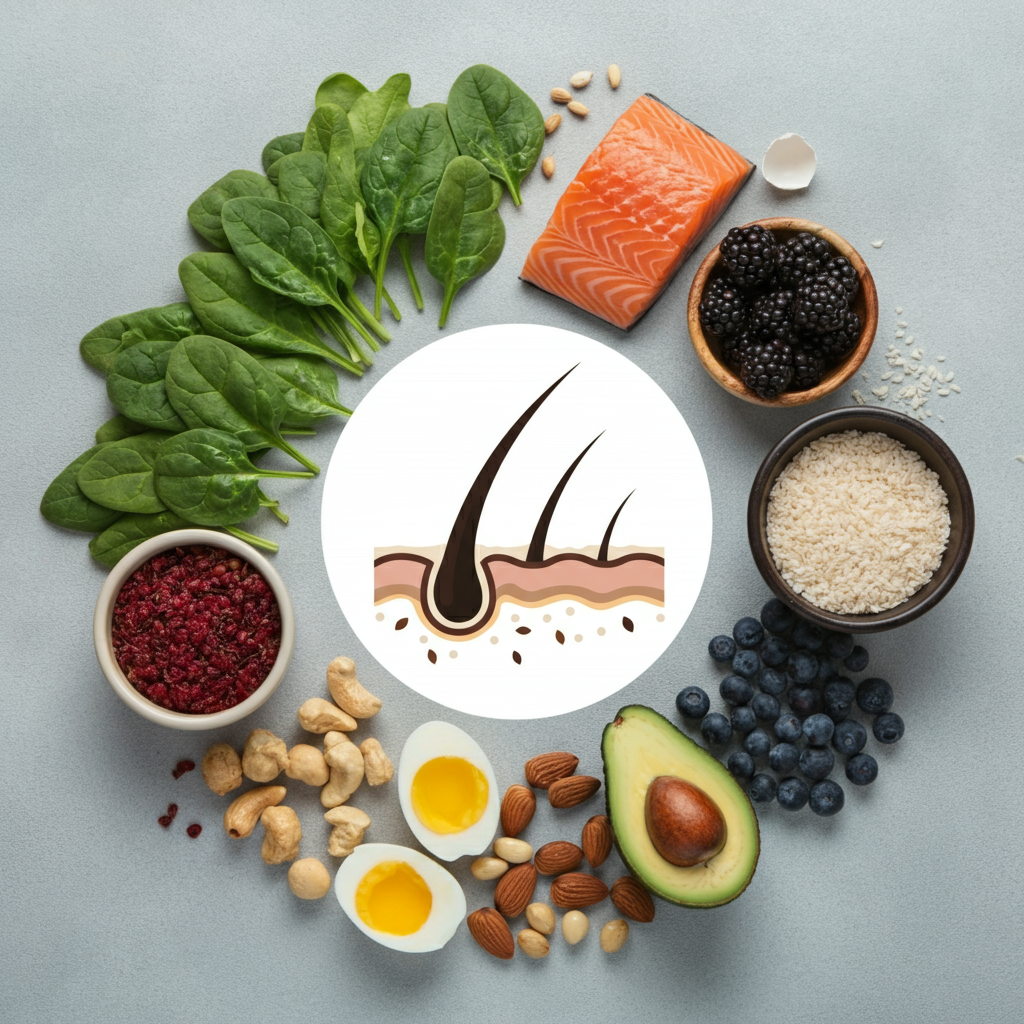
Ever wonder why your hair feels lifeless or falls out more than usual? Nutrition could be the culprit. The health of your hair starts at the hair follicle, which relies on nutrients to stay strong and maintain the hair growth cycle. This cycle includes three essential phases:
- Anagen (growth phase): Hair actively grows for years during this phase, but its length depends on genetics and nutrient supply.
- Catagen (transition phase): A brief period when hair growth slows and hair follicles shrink.
- Telogen (resting phase): Older hair eventually falls out, and new hair begins developing within the follicle.
Adequate nutrition ensures hair follicles stay in the growth phase for longer, while deficiencies can cause a higher number of hairs to shift into the resting and shedding phases prematurely.
Hair Needs Specific Nutrients
Vitamins, minerals, proteins, and healthy fats all work together to nourish hair follicles. Micronutrient deficiencies like low iron or vitamin D can cause thinning or hair loss, while proteins and fatty acids contribute directly to the hair’s structure and moisture balance.
7 Nutritional Powerhouses for Hair Health
1. Biotin (Vitamin B7)
- What it does: Biotin, also dubbed the “hair growth vitamin,” helps boost keratin production, a structural protein found in hair. It strengthens hair strands and prevents thinning.
- Sources: Eggs, almonds, walnuts, sunflower seeds, and sweet potatoes are rich in biotin.
2. Iron
- What it does: Iron ensures proper oxygen supply to your hair follicles through red blood cells. Low iron levels are a common cause of hair shedding, especially in women.
- Sources: Spinach, lentils, tofu, beef, and fortified cereals should be staples in your diet. Pair with vitamin C (like citrus fruits) to enhance absorption.
3. Vitamin D
- What it does: Vitamin D is crucial for creating new hair follicles and encouraging growth. Deficiencies may contribute to hair thinning or alopecia.
- Sources: Fatty fish (like salmon), eggs, mushrooms, fortified milk, and some sunlight can meet your needs.
4. Zinc
- What it does: Aids in cell division and tissue growth at the follicular level. Zinc also maintains scalp oil production, keeping it balanced and avoiding common issues like dandruff.
- Sources: Oysters, beef, pumpkin seeds, and chickpeas are excellent sources of zinc.
5. Omega-3 Fatty Acids
- What it does: Essential fatty acids hydrate the hair and scalp, reduce inflammation that stifles growth, and add shine.
- Sources: Fatty fish (e.g., mackerel, sardines), flaxseeds, and chia seeds are rich in omega-3s.
6. Vitamin E
- What it does: Acts as an antioxidant that protects hair follicles from damage caused by free radicals.
- Sources: Avocados, almonds, sunflower seeds, and spinach are vitamin E-rich.
7. Protein
- What it does: Hair is made up primarily of keratin, a protein. Without sufficient protein, hair becomes weak, brittle, and prone to breakage.
- Sources: Eggs, chicken, fish, beans, legumes, and Greek yogurt are excellent options.
Foods for Hair Growth
1. Leafy Greens
Spinach, kale, and chard provide iron, folate, and vitamin A, making them an all-around essential for scalp and follicle health.
2. Nuts & Seeds
A quick handful of almonds, walnuts, or pumpkin seeds provides a nutrient trifecta of zinc, biotin, and omega-3 fatty acids.
3. Fatty Fish
Salmon and mackerel deliver moisture-boosting omega-3s and vitamin D, promoting healthy hair texture.
4. Eggs
Eggs are a complete protein source and contain both biotin and zinc, vital for strengthening your strands.
5. Avocado
This superfood is loaded with vitamin E and healthy monounsaturated fats to combat dryness and frizz.
6. Sweet Potatoes
Rich in beta-carotene, they convert to vitamin A in the body, enhancing scalp health and sebum production.
7. Berries
Packed with antioxidant-rich vitamin C, berries prevent free radical damage to hair follicles while supporting collagen production.
Supplements for Hair Growth
When whole foods aren’t enough to address deficiencies, supplements may help. Popular hair supplements like Viviscal, Nutrafol, and Hairfinity offer targeted blends of biotin, folic acid, zinc, and other nutrients. However, remember:
- Always consult with a healthcare provider before starting any supplement.
- Excessive supplementation (e.g., too much vitamin A) can be harmful and may worsen hair loss.
Alternatively, focus on adding nutrient-dense foods to your meals instead of over-relying on pills.
Why Hydration Matters for Hair Health
Hydration is often overlooked in hair care routines. Dehydration can leave your hair dry and brittle, leading to split ends and breakage.
Stay hydrated to maintain a good hair health
- Aim for 8-10 glasses of water daily.
- Incorporate water-rich foods like cucumbers, watermelon, and leafy greens into your meals.
- Use hydrating hair masks for external moisture support.
Foods and Habits to Avoid
Some foods and habits can undermine your hair health:
- Sugar: Excess sugar increases insulin resistance and androgen production, leading to hair loss.
- Processed Foods: Additives and preservatives can disrupt hormonal balance.
- Alcohol: Dehydrates your body and strips your hair of essential nutrients.
Meals for Hair Nutrition
Looking to add these nutrients to your daily routine? Here are some quick and easy suggestions:
- Breakfast: Spinach and berry smoothie with a spoonful of flaxseed.
- Lunch: Grilled salmon served with quinoa and kale.
- Snack: A handful of almonds or walnuts.
- Dinner: Roast chicken paired with roasted sweet potatoes and steamed broccoli.
Nourish Your Hair
Hair health isn’t just about using the right shampoos and conditioners; it starts with what’s on your plate. Make sure you’re getting a balanced diet packed with hair-strengthening nutrients like biotin, iron, and omega-3s. When combined with proper hydration and good hair care habits, these dietary choices will help promote healthy, vibrant, and strong hair.
Remember, small changes in your daily nutrition can have a big impact. Start your hair-health routine today, and don’t forget to celebrate your progress as you go!
FAQs about Nutrition and Hair Growth
Q1: Can improving my diet reverse hair loss?
A: Yes, good nutrition can encourage hair regrowth, but results can take 3-6 months. For severe cases, consult a dermatologist.
Q2: Is biotin the most important vitamin for hair?
A: Biotin is essential, but other nutrients like iron, zinc, and vitamin D are equally important.
Q3: Should I drink more water for healthier hair?
A: Yes! Staying hydrated improves scalp and hair follicle health.
Q4: Can supplements solve all my hair problems?
A: Supplements can help, but they’re most effective when paired with a balanced diet and proper care.







